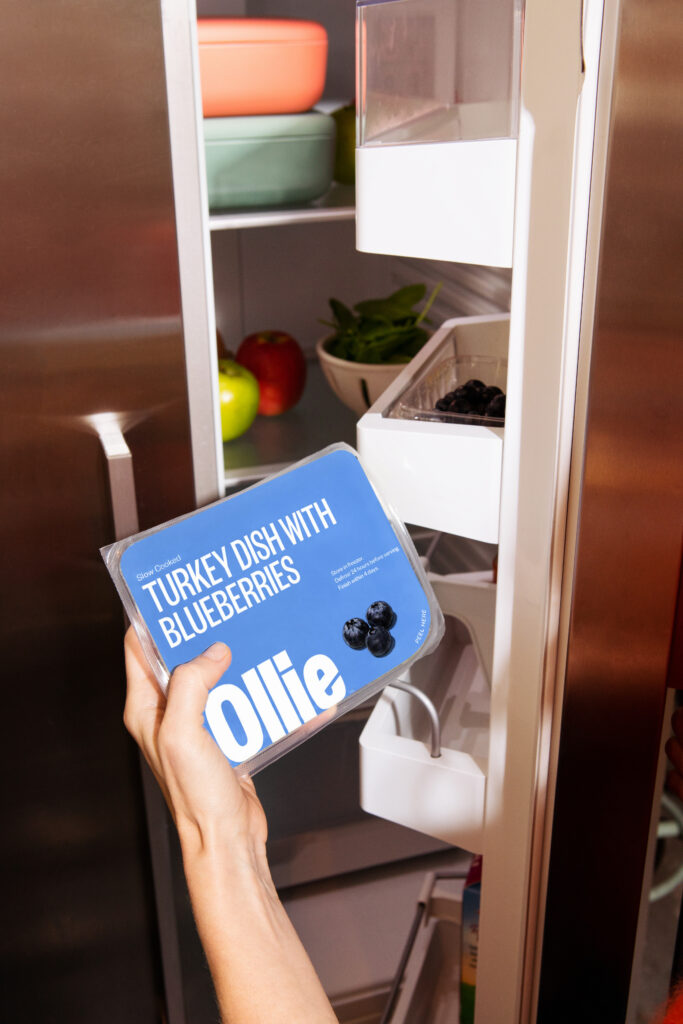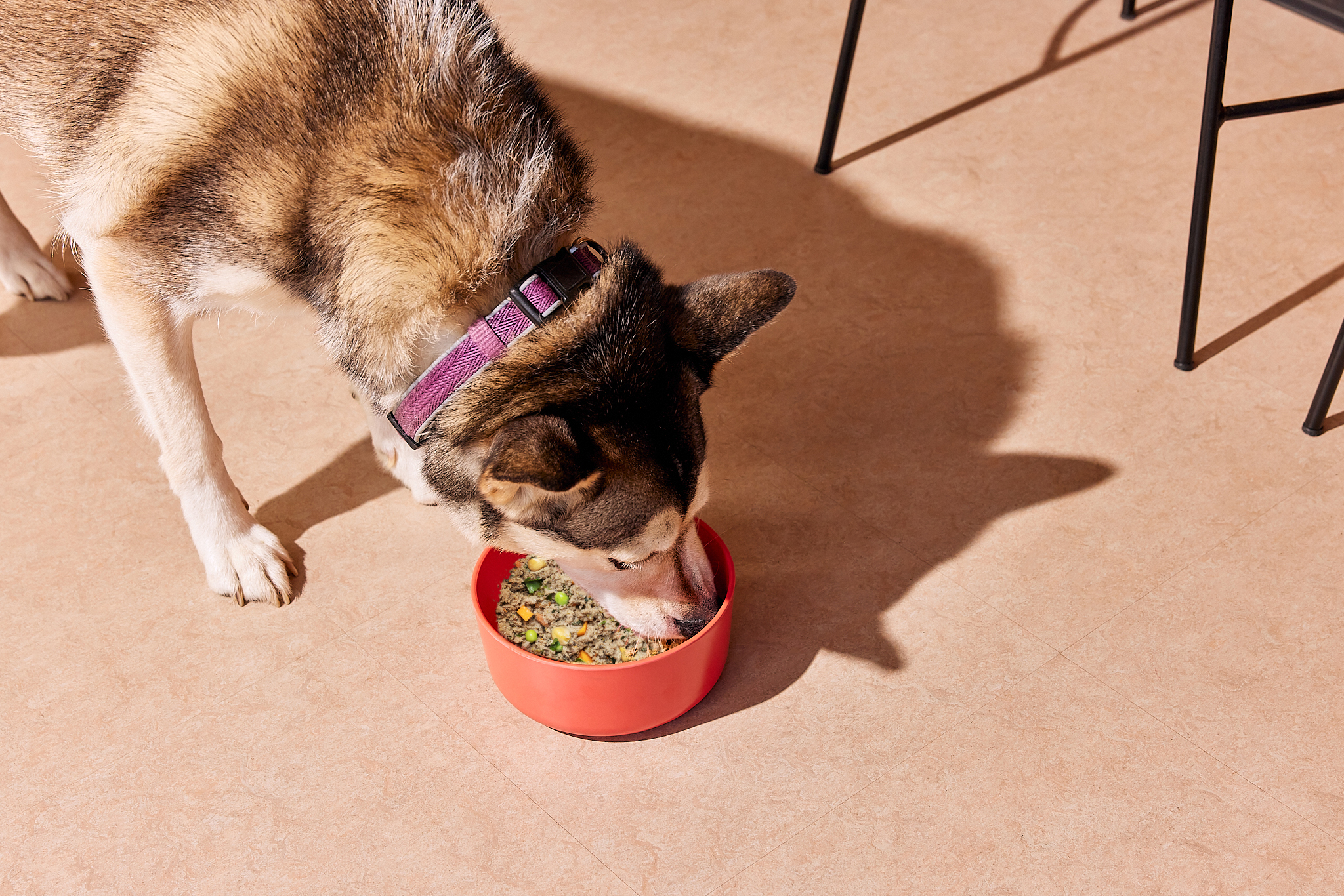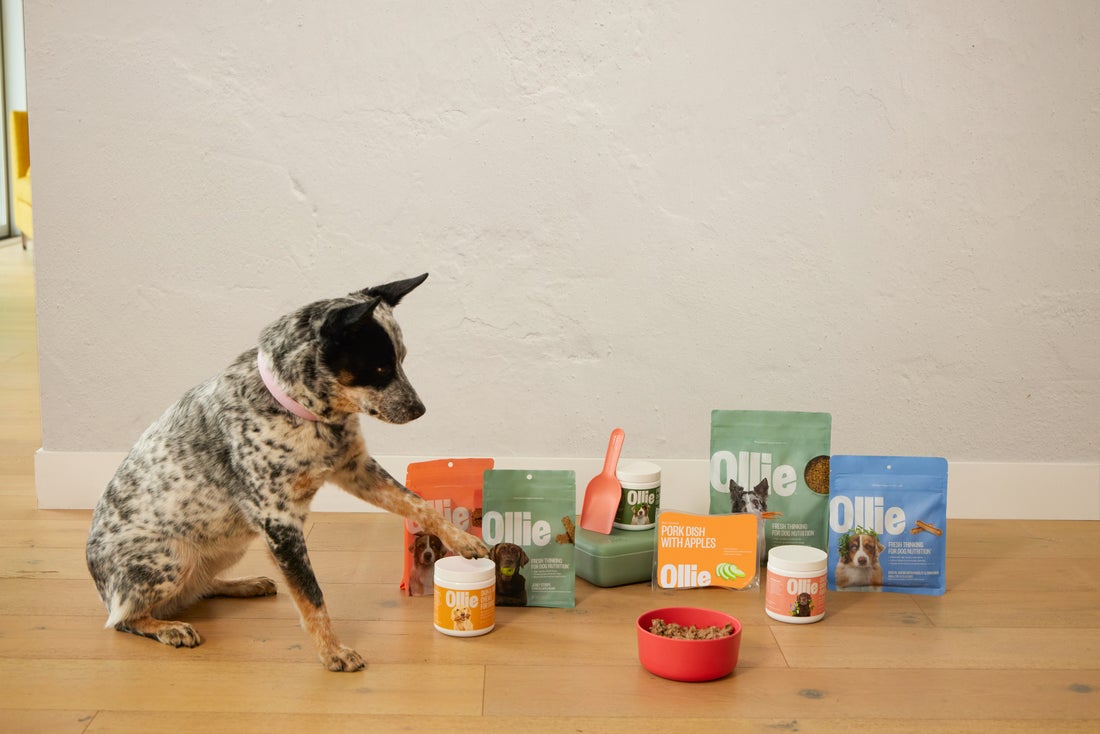Hey Ollie blog readers! We’re offering you an exclusive 60% OFF your starter box! Try now!
When it comes to making sure your dog has a long, happy life, what you put in their bowl matters. More and more research shows that fresh, human-grade dog food can positively impact your dog’s health, potentially even adding years to their life. As pet parents become more conscious about nutrition, understanding the science behind fresh dog food can help you make informed decisions about what’s best for your pup.
The Science Behind Fresh Dog Food Benefits
Fresh dog food represents a return to a more natural way of feeding our canine companions. Unlike heavily processed commercial options, fresh dog food typically contains whole, minimally processed ingredients that preserve natural nutrients and enzymes.
Superior Digestibility and Nutrient Absorption
Studies from the University of Illinois have found that human-grade dog food is not only highly palatable but also more digestible than previously estimated[1]. This improved digestibility means your dog can absorb more nutrients from less food, making fresh diets more efficient at delivering essential nutrition.
When dogs consume fresh food, their bodies can utilize the nutrients more effectively. Research indicates that dogs digest fresh food exceptionally well, with particularly high absorption rates for proteins and fats[2]. This efficient nutrient absorption translates to better overall health and fewer digestive issues.
Inflammation Reduction and Improved Gut Health
Fresh dog food has been linked to reduced inflammation throughout the body. A study examining the effects of mildly cooked human-grade dog food found positive impacts on gene expression related to inflammation markers[2]. This reduction in inflammation can benefit dogs with allergies, skin conditions, and joint problems.
A balanced diet containing fresh vegetables and meat is critical for maintaining your dog’s gut health. This nutritional approach mirrors what dogs’ wild ancestors consumed—meat from prey animals along with the vegetable matter in their stomachs. This natural balance helps keep your dog’s digestive system functioning smoothly, just as nature intended[3].

Longevity: Adding Years to Your Dog’s Life
Perhaps the most compelling reason to consider fresh dog food is its potential impact on lifespan.
Research-Backed Life Extension
Research has revealed a striking difference in longevity between dogs fed fresh food versus commercial options. According to one study, dogs fed a fresh diet lived an average of 13.1 years, while those fed commercial, canned dog food lived an average of 10.4 years—a difference of approximately 2.5 years[3]. That’s potentially 2.5 more years of walks, cuddles, and memories with your beloved companion.
The cumulative effect of consuming highly processed foods with artificial preservatives, synthetic nutrients, and fillers can take a toll on your dog’s health over time. As veterinary nutrition expert Dr. Brown explains, “Humans could live on potato chips and beer alone, but not long or well. It’s the same thing with animals on a commercial diet. Sooner or later, it catches up with them”[3].
Quality of Life Improvements
Beyond simply extending life, fresh food can improve your dog’s quality of life in numerous ways:
- Better digestion resulting in firmer stools and less waste
- Enhanced coat quality and skin health
- Reduced liver strain as indicated by lower alkaline phosphatase levels
- More energy and vitality throughout all life stages
Making the Transition to Fresh Dog Food
Switching to fresh dog food requires some consideration and planning to ensure your dog receives balanced nutrition.
Finding the Right Balance
While fresh food offers numerous benefits, it’s essential to ensure your dog receives complete and balanced nutrition. This is where services like Ollie come in, offering fresh, human-grade dog food that’s formulated with veterinary nutritionists to meet all your dog’s dietary needs.
Ollie’s approach combines the benefits of fresh, human-grade ingredients with the science of canine nutrition. Each meal is personalized based on your dog’s age, weight, breed, activity level, and health concerns, ensuring they receive precisely what they need to thrive.
Gradual Transition for Digestive Success
When introducing fresh food to your dog’s diet, a gradual transition is key to avoiding digestive upset. Start by mixing a small amount of fresh food with their current diet, gradually increasing the proportion of fresh food over 7-10 days until the transition is complete.
Addressing Common Concerns About Fresh Dog Food
Many pet parents have questions about making the switch to fresh food. Let’s address some of the most common concerns.
Cost Considerations
Fresh dog food typically costs more than conventional kibble, but many pet parents find the health benefits justify the investment. Consider that improved health may reduce veterinary costs over time. Additionally, because fresh food is more nutrient-dense and digestible, your dog may need less food overall, offsetting some of the cost difference.
Some pet parents choose to use fresh food as a topper or mix it with high-quality kibble to balance cost with nutritional benefits. Even adding just 20% fresh food to a dog’s diet can lead to significant health improvements.

Storage and Convenience
Fresh dog food requires refrigeration or freezing, which means more planning than shelf-stable kibble. However, subscription services like Ollie deliver pre-portioned meals directly to your door on a regular schedule, making it convenient to feed fresh without the hassle of shopping and meal preparation.
Comparing Fresh Dog Food to Other Options
When evaluating different feeding options for your dog, it’s helpful to understand how fresh food compares to alternatives.
| Food Type | Digestibility | Processing Level | Nutrient Preservation | Average Cost |
| Fresh Food | Very High | Minimal | Excellent | Higher |
| Kibble | Moderate | High | Fair | Lower |
| Canned Food | High | Moderate | Good | Moderate |
| Raw Food* | Very High | None | Excellent | Higher |
*A raw food diet has been associated with a number of risks, such as bacterial contamination, nutrient deficiencies, and issues with digestion.
While some comparative studies suggest that fresh meals don’t provide significant health benefits over commercially produced, nutritionally complete pet foods[4], the growing body of research indicating improved digestibility, reduced inflammation, and potential lifespan extension makes fresh food worth considering for many pet parents.
Is Fresh Dog Food Right for Your Pup?
Fresh dog food can benefit dogs of all ages and breeds, but it may be particularly beneficial for:
- Dogs with digestive issues or food sensitivities
- Pets with skin problems or allergies
- Senior dogs who need more easily digestible nutrition
- Picky eaters who turn their nose up at conventional dog food
- Dogs recovering from illness or surgery
Consulting with your veterinarian before making significant changes to your dog’s diet is always recommended, especially for dogs with existing health conditions.
Frequently Asked Questions
How much fresh food should I feed my dog?
The amount depends on your dog’s size, age, activity level, and metabolism. Services like Ollie calculate the precise portion size based on your dog’s specific needs and provide pre-portioned meals to make feeding simple.
Can puppies eat fresh dog food?
Yes, puppies can thrive on fresh food formulated to meet their specific nutritional needs for growth and development. Puppy-specific fresh food formulas contain the appropriate balance of protein, fat, calcium, and phosphorus needed for healthy development.
How long does fresh dog food last in the refrigerator?
Typically, fresh dog food stays good in the refrigerator for 4-7 days after thawing. Always check the packaging for specific storage instructions, as this can vary by brand and preparation method.
Will my dog still get all the nutrients they need from fresh food?
When properly formulated by pet nutrition experts, fresh dog food provides complete and balanced nutrition. Look for foods that meet AAFCO (Association of American Feed Control Officials) standards for your dog’s life stage.
Can fresh dog food help with my dog’s allergies?
Many dogs with food sensitivities or allergies show improvement when switched to fresh food. The limited, whole-food ingredients make it easier to identify and avoid allergens, while the anti-inflammatory properties of fresh food may help reduce allergic reactions.
Making the switch to fresh, human-grade dog food, like Ollie, is a science-backed approach to positively impacting their overall health. By providing your dog with minimally processed, nutrient-rich meals, you’re investing in a longer, happier life.
Citations
[2] https://pmc.ncbi.nlm.nih.gov/articles/PMC9527297/
[3] https://blog.myollie.com/health-benefits-of-fresh-natural-diet-for-dogs/
[4] https://www.frontiersin.org/journals/animal-science/articles/10.3389/fanim.2025.1506003/full
Tagged As:

The nutrition your dog needs,
the food they want.

Enjoying our articles? Subscribe our Newsletters and get new articles directly to your inbox
You might also like
21 July 2025
6 MINS READ
Can Dogs Eat Nuts? Which Nuts Are Safe & Serving Guide
Can dogs have nuts? Some nuts are fine in moderation, but others can cause serious harm. This quick guide breaks down which nuts are safe for dogs, which to skip, and how to feed nut butters respon…
18 July 2025
6 MINS READ
Can You Mix Fresh Dog Food With Kibble?
If you’re feeding your dog kibble but want to upgrade their bowl, you’re not alone. Many pet parents ask if they can mix fresh dog food with kibble to get some of the benefits of fresh food wi…
by Ollie Pets
18 July 2025
5 MINS READ
Does Fresh Dog Food Help With Weight Loss?
If you’ve noticed your dog carrying a few extra pounds, you’re not alone. According to the Association for Pet Obesity Prevention, over half of dogs in the U.S. are overweight or obese. Extra …
by Ollie Pets







